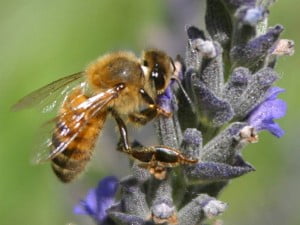 As fossil records demonstrate, honey bees have been in existence for over 35 million years. During this long period of time, bees have had a determining influence on the propagation of a variety of plant species that have benefited from their pollination services. Consequently, bees have shaped our environment, and provided conditions that have significantly impacted the selection and evolution of many forms of life. Honey bees are one of the most vital elements of our ecosystem. One-third of our diet relies on bee pollination. According to the International Bee Research Foundation, “The success or failure of many agricultural crops depends on pollination: bees add billions and billions of dollars to the agro-economy as they pollinate these crops. Without bees, the whole human race would starve to death.” In 1940 the USDA began keeping records of numbers of managed honey bee colonies in the United States. At that time they counted six million colonies. In 2018 statistics show 2.7 million managed colonies in our country. Due to a variety of factors, bees have been experiencing a steady population decline over the years much of that having to do with the loss of small farms and the increase of dense population areas.
As fossil records demonstrate, honey bees have been in existence for over 35 million years. During this long period of time, bees have had a determining influence on the propagation of a variety of plant species that have benefited from their pollination services. Consequently, bees have shaped our environment, and provided conditions that have significantly impacted the selection and evolution of many forms of life. Honey bees are one of the most vital elements of our ecosystem. One-third of our diet relies on bee pollination. According to the International Bee Research Foundation, “The success or failure of many agricultural crops depends on pollination: bees add billions and billions of dollars to the agro-economy as they pollinate these crops. Without bees, the whole human race would starve to death.” In 1940 the USDA began keeping records of numbers of managed honey bee colonies in the United States. At that time they counted six million colonies. In 2018 statistics show 2.7 million managed colonies in our country. Due to a variety of factors, bees have been experiencing a steady population decline over the years much of that having to do with the loss of small farms and the increase of dense population areas.
Regardless of how you may choose to contribute to the sustainability of our bee and pollinator population, SFBA would like to challenge you to adopt the philosophy of becoming a steward of our environment and for bees and other native pollinators. Acting individually and acting locally impacts the whole. One healthy beehive can make a difference. One organically managed garden can make a difference.
- Beekeeping classes
- Monthly beekeeper meetings (February – October)
- Beekeeping mentoring
- Educational outreach
- Swarm collection resource
- Resource listing for local genetically adapted bees
- Resource listing for local honey suppliers
- Local native pollinator information resource

